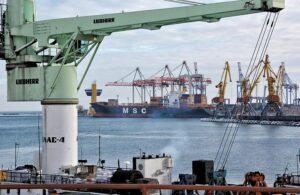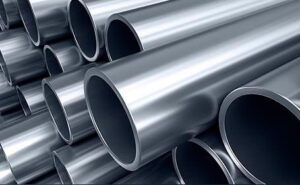
Odesa seaport in July received a positive financial result from economic activities at the level of UAH 1.3 million.
According to the press service of the Ministry of Infrastructure, the reasons for the company’s profitability are the introduction of a balanced tariff policy, attracting new customers, reducing the company’s expenses and modernizing equipment.
The department notes that the previous periods were unprofitable for the company. In particular, a loss of UAH 9.4 million was recorded in June. Over the past six months, the total loss of the enterprise amounted to UAH 29 million.
“For the first time in the past six months, Odesa port will profit from its activities. The indicator for June in the amount of UAH 4 million is the largest since July last year. The successful result was demonstrated despite the fact that, in general, July was the month with the lowest number of ship calls since the beginning of 2021,” the ministry said.
In January-June 2021, Odesa seaport handled 10.402 million tonnes of cargo, which is 13.6% less than in the same period in 2020. In 2020, the seaport handled 23.37 million tonnes of cargo, which is 7.8% less than in 2019.

The Swiss authorities have lifted restriction on entry of Ukrainian citizens into the country.
“The restriction on entry into Switzerland has been lifted for citizens of Ukraine since August 2,” the online resource of the Ministry of Foreign Affairs of Ukraine reports.
It is noted that in order to enter Switzerland, Ukrainians must present a certificate of a full vaccination course (if 14 days have passed since the last dose), a negative PCR test result (must be done a maximum of 72 hours before entry), a negative rapid antigen test result (must be done a maximum of 48 hours before entry) or confirmation that you have had coronavirus in the last six months and have recovered.
At the same time, only a certificate of vaccination with drugs recognized in Switzerland is taken into account, in particular, Pfizer/BioNTech (BNT162b2/Comirnaty/Tozinameran), Moderna (mRNA-1273/Spikevax/COVID-19 vaccine Moderna), AstraZeneca (AZD1222 Vaxzevria/C, Janssen/Johnson & Johnson (Ad26.COV2.S), Sinopharm/BIBP (SARS-CoV-2 Vaccine (Vero Cell)), Sinovac (CoronaVac).
“For persons who arrived in Switzerland from regions with dangerous variants of the virus and who have been in these regions for more than ten days, and who are not vaccinated or cannot prove that they have had COVID-19 in the last six months, a ten-day quarantine is provided,” the Foreign Ministry said.

Ukraine may receive a $700 million tranche from the International Monetary Fund (IMF) in September, the adviser to the President of Ukraine on economic issues, Oleh Ustenko, has said.
“The President of the country had a more than successful telephone conversation with Managing Director of the International Monetary Fund Kristalina Georgieva. The IMF mission is going to Ukraine. In addition, Ukraine has implemented all the preconditions of the IMF. We expect that a new tranche of about $700 million will be received from the IMF rather quickly,” he told Interfax-Ukraine.
“I suppose that now we are moving according to the following scenario: in September – the mission, at once the issue of Ukraine is brought up to a meeting of the IMF Board of Directors, and in September I expect that we will receive a new tranche,” the president’s adviser added.
At the same time, Ustenko does not rule out the possibility of extending the Stand-By Arrangement (SBA).
“We have made serious progress, and this was noted. So I do not rule out that the SBA may be extended,” he said.

The U.S. Department of Commerce, following antidumping investigations of seamless carbon and alloy steel standard, line, and pressure pipes from Russia, South Korea and Ukraine, has announced the size of the final duties.
According to the information on the official website of the International Trade Administration, the final dumping level (the amount of antidumping duties) for seamless pipes from Korea is set at 4.48% for all Korean companies, including ILJIN Steel Corporation) and 4.44% is the dumping margin with an adjustment to offset export subsidies. For Russian companies, including TMK it is 209.72%, for Ukrainian companies, including Interpipe it is 23.75%.
In addition, countervailing duties have been set for all Korean companies in the amount of 1.789%, for ILJIN Steel Corporation – 1.78%, for all Russian companies – 48.38%.
The duties will be imposed in the event of a positive final decision from the U.S. International Trade Commission (ITC). The ITC shall make its decision on August 9 of this year, and the order shall be issued on August 16.
The published documents state that 11,471 tonnes were imported from the Russian Federation to the United States in 2020, in 2019 – 39,634 tonnes, in 2018 – 38,024 tonnes, from South Korea – 23,068 tonnes, 17,112 tonnes and 15,839 tonnes, from Ukraine – 32,801 tonnes, 43,667 tonnes and 38,974 tonnes, respectively.

Primary registrations of new passenger cars in Ukraine in January-July this year increased by 28% compared to the same period in 2020, to 58,100 units, the Ukrautoprom association reports.
According to the information on its website, in particular registrations in July increased by 16% compared to July 2020, to 9,768 units.
The best result was again demonstrated by Japanese-based Toyota with an increase in registrations by 34%, up to 1,535, followed by French-based Renault, whose registrations decreased by almost 10%, to 1,301 units.
The third line of the rating with an 87% increase (up to 800 cars) was confidently taken by Kia, the fourth was Skoda with the registration of 618 cars (35% more), and the top five monthly leaders with a 5% increase in sales were closed by Hyundai with 465 units.
The ten most popular brands in July also included: Volkswagen with 452 units (more by 25%), Nissan – 439 units (more by 32%), Chery – 412 units (more by 91%), Mitsubishi – 411 units (more by 70%), Suzuki – 384 units (more by 9%).
The bestseller of the month was the compact crossover Toyota RAV4 with 659 registrations.
According to the information and analytical group AUTO-Consulting, published on its website, July sales have traditionally become peak since the beginning of the year and in fact the Ukrainian car market has set a post-crisis sales record – according to the group, sales increased by 10% from July 2020, to 9,800.
“We have not sold so much since February 2014,” the experts say.
According to them, the three leaders in July coincide with the data of Ukrautoprom, but Renault, which took the second position, added 33% in sales, to 1,317 units, and the leader of the rating, Toyota, increased sales by 19%, to 1,552units.
Kia sales in July increased by 9.16%, to 810 units, Skoda raised them by 3%, to 632 cars, Hyundai – by 4%, to 469 units.